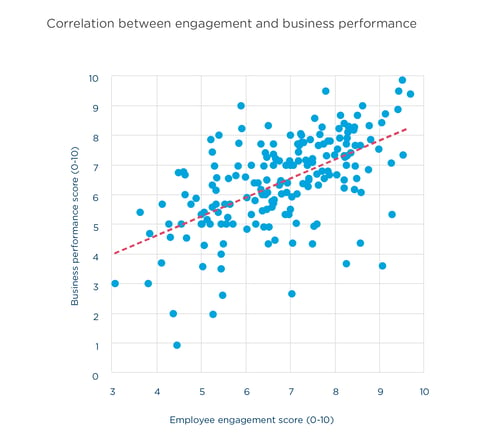It’s been proven that making employee appreciation initiatives a central part of an organisation’s plans is crucial to supporting employee wellbeing, unlocking productivity and driving business growth. However, these initiatives are often only geared towards office-based workers.
With the modern workforce split between office-based, hybrid and remote workers, it’s essential to ensure any employee appreciation ideas you adopt work for all your staff.
Why is employee appreciation so important?
Building on Maslow’s Hierarchy of Needs, we've created a framework that maps employee needs to the levers, solutions and initiatives that can support your people in becoming the best versions of themselves. This framework is called the Total Employee Experience pyramid, and as you can see, the appreciation block sits comfortably at the top.

But before we go into our 11 ideas to show appreciation to your remote employees, let's first take a look at some of the reasons why employee appreciation is crucial at an organisational level:
Boosts morale and engagement
Employees aren’t machines – they need more than just a monthly payslip to keep them motivated. By showing appreciation for them, whether it’s in reaction to successful work or just everyday appreciation, you’ll be able to keep your team’s morale high and each member engaged with their work.
Reduces feelings of isolation
For some, remote working can be isolating. Without the general camaraderie of the office, employees can sometimes feel separated from their colleagues. This can be reversed with the employee appreciation ideas we’ve outlined below, giving remote workers the flexibility they desire while keeping them connected to their team.
Motivates high performance
By embracing employee appreciation you are demonstrating to your workforce that results, length of service, and consistent hard work doesn’t go unnoticed. Employee appreciation isn’t just recognised by the people receiving it, other colleagues will notice and, in turn, up their game, leading to an improvement in performance across the board.

In fact, our Economic Value Study has proven that organisations who strategically apply the right levers and solutions to enhance the employee experience can expect to see a 5-7% increase in business performance.
Improves retention
Employees move on to new jobs for many reasons. Career progression and higher salaries are always enticing, but if you’ve created a positive work environment by implementing employee appreciation initiatives, you’re more likely to retain your best talent. Remember, there’s a reason ‘appreciation’ sits at the top of the Total Employee Experience pyramid.
Increased wellbeing
The connection between employee appreciation and wellbeing at work is well established. Expressing gratitude to your staff is a key aspect in making them feel secure, motivated, and respected by their organisation. This increased wellbeing can result in a better relationship between managers and team members as well – constructive feedback is much easier to give and better received if appreciation initiatives are also regularly carried out.
10 appreciation ideas for remote employees
Here are some ideas you can bring in to make sure your remote employees and teams feel appreciated in your organisation.
Encourage peer-to-peer recognition
Remote workers can be at risk of missing out on the big celebration of a completed project or a target achieved. After all, we haven’t found a way to send digital high-fives yet! While everyone loves to receive a card, the digital age has made sending them even easier. Digital cards, often known as eCards, are used by plenty of businesses as a vessel for colleagues to write personal notes to each other, whether it’s celebrating birthdays, congratulating them on achievements or welcoming them to the team.
This is why encouraging peer-to-peer recognition is so important if any of your team are remote workers. A tailored employee reward and recognition programme allows your team to virtually congratulate one another, increasing cohesion between staff and improving morale. Plus by giving them the chance to give and receive rewards, any achievement is immediately partnered with tangible personal benefits.
Below are some eCards created by Boden, a British fashion retailer who saw 772 eCards sent in just one year, contributing to an impressive 20% increase in employee engagement. Read more about Boden's story here

Celebrate milestones and achievements with awards
Any kind of professional milestone, such 10 years at your organisation or a new qualification obtained, should be celebrated. But how best to do this?
Awards are a great way to recognise achievements and milestones. This is particularly true for remote workers as they won’t experience the general tone of appreciation and congratulations that can be felt in an office setting.
Ensure two-way communication
A common concern around remote working is that without a central office space, employees will start to feel disconnected from their workplace. This can be rectified by creating a work culture that enables and promotes two-way communication.
Members of the senior leadership team should be communicating openly with staff through regular updates and employee news channels. They also need to create channels that allow staff to express themselves in a way that will be heard.
Surveys and feedback forms are great for this, but you can take it one step further by inviting staff to contribute to your organisation’s blog. Some businesses have also found success by inviting groups of employees to join virtual roundtable meetings with members of the senior leadership team. These are informal discussions that allow staff to speak directly to the senior management, airing concerns, suggesting ideas, or just giving insight into the experience of more junior employees.
Host virtual team bonding events
These might have seemed strange 10 years ago, but virtual events have now become a regular (and effective) tactic in creating strong team bonds.
Remote workers may see their colleagues every day thanks to instant messaging and video calling services, but it’s important to keep the social aspect of working alive, even when you can’t be together IRL. It could be a virtual teams drinks session, a video quiz, or even a weekly ‘show and tell’ session. These events are sure to help your team get to know each other and gel together professionally.
Provide digital wellbeing resources
By the nature of their working conditions, remote workers will be spending a lot of time staring at a computer screen and interacting with colleagues through the digital world. This means that their digital wellbeing must be a priority.
By providing digital wellbeing resources you can be sure your remote staff are remaining the best versions of themselves. Digital wellbeing resources can range from physical health tips around desk posture and eye care, to advice on mental health care while working in the digital world.
Clermont Hotel Group are a fantastic example of an organisation who looked to supporting employee wellbeing through digital resources. By working with Reward Gateway | Edenred, the company launched its "Be Well" Wellbeing Centre, which saw 1,200 visits in just one year and contributed to a 44% reduction in employee turnover. Discover more about Clermont's journey here.
.png?width=500&height=500&name=2024_Clermont%20Hotel%20Group%20imagery%20tablet_UK-2%20(1).png)
Offer flexibility
One of the reasons behind many people opting for remote working is the extra flexibility it offers, giving them more space for everyday tasks such as school runs or doing the weekly shop. Rather than trying to limit this benefit, organisations with remote workers should champion it.
Offering flexible working arrangements (such as setting ‘core working hours’ but allowing staff to log and off whenever works for them) can benefit all your staff, particularly remote workers.
Provide a range of benefits to promote personalisation
We’ve talked a lot about ‘remote workers’ as a group in this blog, but remember that any members of your team who work from home are still individuals with their own needs and interests. This is why it’s crucial that you offer a wide range of benefits to ensure they can be personalised to each employee.
Those who commute in every day might want different benefits to those who work from home – that cycle to scheme work you’ve started is great, but won’t work for everyone! Our platform offers a huge selection of benefits in an easy-to-use online system, so you can be sure that every employee’s needs are catered for, regardless of where they work.
Try out a ‘virtual experience’
No, we don’t just mean playing computer games together! Following the post-pandemic boom of workers going remote, many companies have found success in offering virtual experiences in place of the usual in-person team-building experiences.
There are plenty of virtual experiences to choose from, but some easy ones to get your remote colleagues involved in include virtual escape rooms, online bingo games, or even online cooking classes where staff are invited to follow along with a cooking instructor from their own kitchens.
These experiences will differ from the virtual team bonding events mentioned above, as rather than being a regular occurrence, virtual experiences are closer to occasional benefits.
Highlight success in newsletters
Newsletters have always been an important part of keeping a workforce in the loop with company news and connected to their colleagues, but they’re absolutely vital if part or all of your team works remotely.
Use them to highlight successes in your team. This gives you a chance to celebrate the work of remote workers who might miss out on words of affirmation they would usually receive within the office. Of course, you can always take this approach one step further…
Write personalised thank you notes
Positive interactions with senior figures in the organisation can be incredibly meaningful to team members. But strolling over to a desk and thanking someone for their work isn’t possible with remote workers. That’s why personalised thank you notes should be utilised.
The key thing here is that the notes should be PERSONAL. Don’t just send a generic ‘thank you’ email. Take the time to write out why you’re happy with the team member and how their work will impact the organisation.
Whether you're looking to implement some of these ideas or build on your existing appreciation initiatives, speaking with one of our employee experience experts is a great way to get the ball rolling.

 Alexandra Powell
Alexandra Powell



